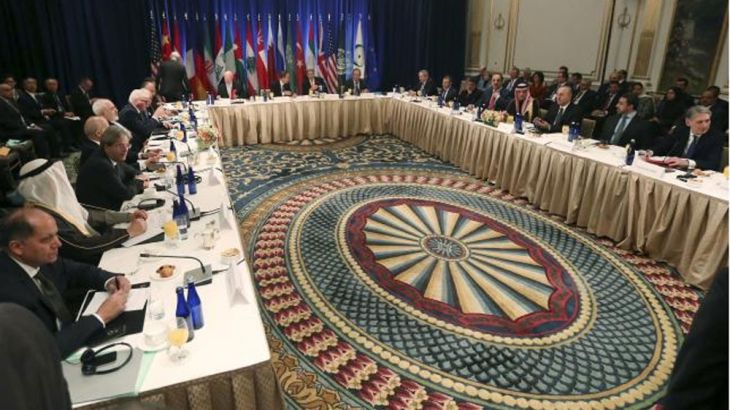World powers meet in New York for Syria talks
Foreign ministers meet in an attempt to arrange direct negotiations between Syrian government and opposition rebels.

Foreign ministers from around the Middle East and Europe are meeting in New York City for talks to bring the Syrian government and armed opposition to the negotiating table.
Friday’s meeting comes amid strong disagreement between supporters of Syrian President Bashar al-Assad and backers of the opposition on which groups should be included in any talks.
Mohammad Javad Zarif, Iran’s foreign minister, ruled out on Thursday any talks that included Ahrar al-Sham, a large rebel faction, which he grouped together with al-Nusra Front and the Islamic State of Iraq and the Levant (ISIL) group.
|
|
“There has been no agreement on two important aspects; one is the opposition groups and the composition of the opposition groups, and second is the list of terrorist organisations,” Zarif told Al Jazeera’s Diplomatic Editor James Bays in New York.
Our correspondent, quoting Arab diplomatic sources, said that there had been no progress in definitively deciding which opposition groups should take part.
“It’s unlikely that they’re going to agree at this meeting on either a list of what they describe as terrorists or a confirmed list of participants in talks, which are due to take place in January,” he said.
The rebels themselves have demands that many of the participants in Friday’s talks are willing to enforce.
Meanwhile, US President Barack Obama reaffirmed his insistence that Assad step down, warning there can be no peace there without a legitimate government.
“I think that Assad is going to have to leave in order for the country to stop the blood, for all the parties involved to be able to move forward in a nonsectarian way,” Obama said at a year-end news conference at the White House.
“He has lost legitimacy in the eyes of the country.”
Opposition groups met in Saudi Arabia earlier this month, ruling out any continuation of Assad’s rule, but John Kerry, US secretary of state, has said his removal is not a precondition for talks.
|
|
“The ISSG [International Syria Support Group] may have a different sense of what a political transition might look like than the opposition groups,” John Kirby, US state department spokesman, said.
Jessica Ashooh, an analyst at the Atlantic Council, told Al Jazeera that as long as Assad’s status remained unresolved, the talks were unlikely to be fruitful.
“As long as people feel unrepresented by their governments, you’ll just have constant insurgency until you get a political solution,” she said.
The talks will include the United States,Turkey and Arab Gulf states, which have supported the Syrian opposition, as well as Assad’s allies Russia and Iran, which are both involved militarily in the conflict.
The conflict in Syria started in mid-2011 after protests against Assad’s rule were violently put down by government security forces.
The war has killed more than 300,000 people according to some estimates, and sent millions of Syrians fleeing for neighbouring countries and Europe, giving rise to the worst refugee crisis since World War II.
Groups such as ISIL have also conquered large tracts of land, from where they have planned attacks on a number of states including France, Turkey, and Lebanon.
![Iran has rejected the involvement of a number of Syrian rebel groups, accusing them of ties with al-Qaeda [Vahid Salemi/AP]](/wp-content/uploads/2015/12/bf8671bfa51e438a97ac517e0e35428f_18.jpeg)